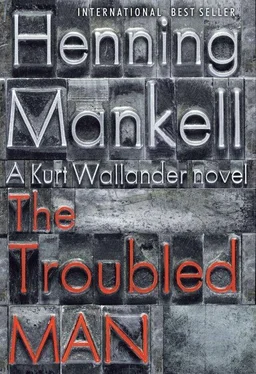“I believe you,” she said eventually. “Everything you’re telling me comes down to one single fact, one single circumstance in your life. That you are far too lonely. You suddenly lose control, and there’s nobody around to calm you down, to stop you from rushing off. But there’s still something I wonder about.”
“What?”
“Have you told me everything? Or is there something you’re not saying?”
Wallander wondered for a moment if he should tell her about the strange feeling of a shadow closing in on him. But he shook his head; there was nothing more to tell her.
“What do you think’s going to happen?” she asked. “I can’t remember what the rule book says.”
“There’ll be an internal investigation. After that, I have no idea.”
“Is there a chance they’ll fire you?”
“I figure I’m too old to be fired. Besides, the offense isn’t all that serious. But they might force me into early retirement.”
“Wouldn’t that appeal to you?”
Wallander was chewing away at an apple when she asked him that question. He hurled the core at the wall with all his strength.
“You’ve just said that my problem is loneliness!” he roared. “What would it be like if I was forced to retire? I’d have nothing at all left.”
Wallander’s bellowing woke the baby up.
“I’m sorry,” he said.
“You’re scared,” she said. “I can understand that. I would be too. I don’t think anybody should apologize for being scared.”
Linda stayed until the evening, made him dinner, and they spoke no more about what had happened. Kurt escorted her to the car through the cold, gusting wind.
“Will you manage?” she asked.
“I’ll always get by. But thank you for asking.”
The following day Wallander had a call from Lennart Mattson, who wanted to see him without delay. When they met, he was introduced to an internal affairs officer from Malmö who had come to interrogate him.
“Whenever it suits you,” said the investigator, whose name was Holmgren and who was about the same age as Wallander.
“Now,” said Wallander. “Why put it off?”
They shut themselves away in one of the police station’s smallest conference rooms. Wallander made an effort to be precise, not to make excuses, not to trivialize what had happened. Holmgren took notes, occasionally asked Wallander to take a step backward, repeat an answer, and then continue. It seemed to Wallander that if the roles had been reversed, the interrogation would doubtless have proceeded in exactly the same way. It took slightly more than an hour. Holmgren put down his pen and looked at Wallander — not in the way one would look at a criminal who had just confessed, but as somebody who had messed things up. He seemed to be feeling sorry for the trouble Wallander found himself in.
“You didn’t fire a shot,” said Holmgren. “You forgot your gun when you drank too much at a restaurant. That’s serious — there’s no getting away from that — but you haven’t actually committed a crime. You haven’t assaulted anyone; you haven’t taken bribes; you haven’t harassed anyone.”
“So I’m not going to be fired, you don’t think?”
“Hardly. But it’s not up to me.”
“But your guess would be...?”
“I’m not going to guess. You’ll have to wait and see.”
Holmgren began collecting his papers and placing them carefully in his briefcase. He suddenly paused.
“It’s obviously an advantage if this business doesn’t get into the hands of the media,” he said. “Things always take a turn for the worse when we can’t hush up this sort of thing and keep it inside the police force.”
“I think we’ll be okay,” Wallander said. “There’s been no mention of it so far, so that’s an indication that nothing has been leaked.”
But Wallander was wrong. That same day there was a knock on his door. He had been lying down, but he got up because he thought it was one of his neighbors. When he opened the door, a photographer took a flash picture of Wallander’s face. Standing next to the cameraman was a reporter who introduced herself as Lisa Halbing, with a smile Wallander immediately classified as fake.
“Can we talk?” she asked aggressively.
“What about?” wondered Wallander, who already had a pain in his stomach.
“What do you think?”
“I don’t think anything.”
The cameraman took a whole series of pictures. Wallander’s first instinct was to punch him, but he did no such thing, of course. Instead he demanded that the cameraman promise not to take any photographs inside the house; that was his private domain. When both the cameraman and Lisa Halbing promised to respect his privacy, he let them in and invited them to sit down at his kitchen table. He served them coffee and the remains of a sponge cake he’d been presented with a few days earlier by one of his neighbors who was an avid baker.
“Which newspaper?” he asked when he had finished serving coffee. “I forgot to ask.”
“I should have said.” Lisa Halbing was heavily made up and was trying to conceal her excess weight beneath a loose-fitting tunic shirt. She was in her thirties, and looked a bit like Linda — although his daughter would never have worn so much makeup.
“I work for various papers,” Halbing said. “If I have a good story, I sell it to the one that pays best.”
“And right now you think I’m a good story, is that it?”
“On a scale of one to ten you might just about scrape into four. No more than that.”
“What would I have been if I’d shot the waiter in the restaurant?”
“Then you’d have been a perfect ten. That would obviously have been worth a front-page headline.”
“How did you find out about this?”
The cameraman was itching to pick up his camera, but he kept his promise. Lisa Halbing was still wearing her forced smile.
“You realize of course that I’m not going to answer that question.”
“I assume it was the waiter who tipped you off.”
“It wasn’t, in fact. But I’m not going to say anything more about that.”
Looking back, it was clear to Wallander that one of his colleagues must have leaked the details. It could have been anyone, even Lennart Mattson himself. Or the investigating officer from Malmö. How much would they have earned? All the years he had been a police officer, leaks had been a continuing problem, but he had never been affected himself until now. He had never contacted a journalist, nor had he ever heard the slightest suggestion that any of his close colleagues had done so either. But then, what did he know? Precisely nothing.
Later that evening he called Linda and warned her about what she could expect to read in the following day’s paper.
“Did you tell them the honest truth?”
“At least nobody can accuse me of lying.”
“Then you’ll be okay. Lies are what they’re after. They’ll make a meal of it, but I don’t think there’ll be any repercussions.”
Wallander slept badly that night. The following day he was waiting for the phone to ring, but he had only two calls. One was from Kristina Magnusson, who was angry about the way the incident had been blown out of proportion. Shortly afterward, Lennart Mattson called.
“It’s a pity you made a statement to the press,” he said disapprovingly.
Wallander was furious.
“What would you have done if you’d been confronted by a journalist and a cameraman on your front doorstep? People who knew every detail of what had happened? Would you have shut the door in their face, or lied to them?”
“I thought it was you who had contacted them,” said Mattson lamely.
“Then you are even more stupid than I thought you were.”
Читать дальше












